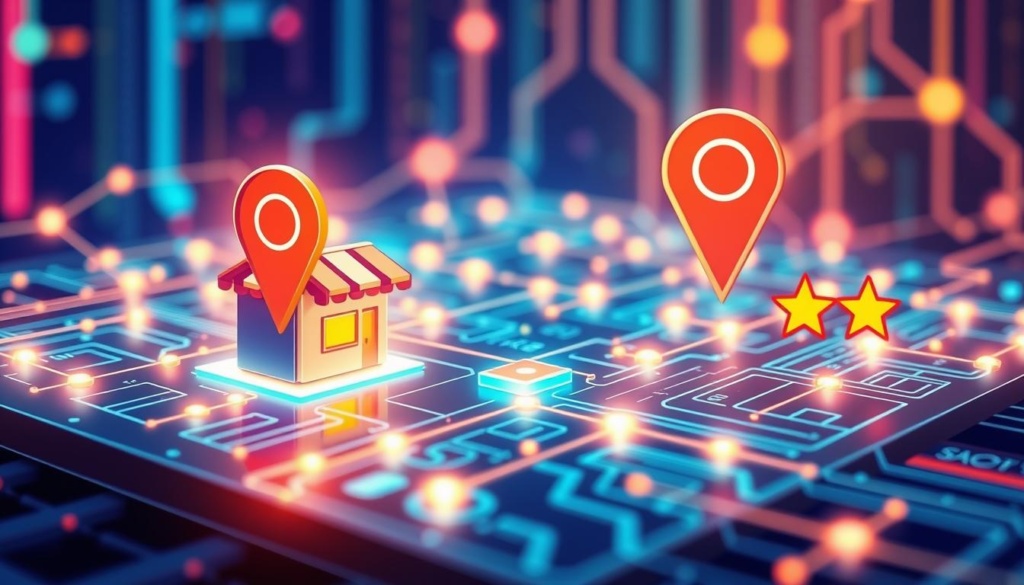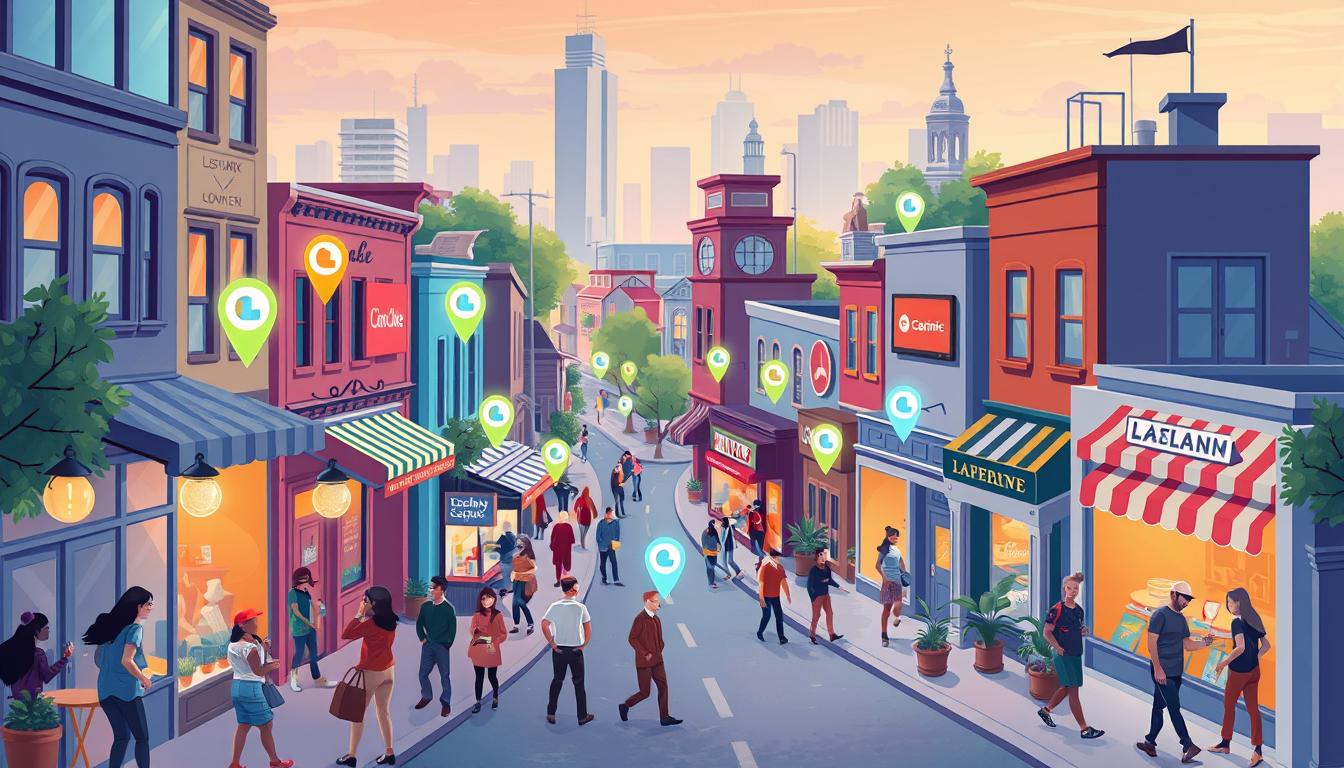In today’s world, hyper-local SEO is key for your local business to grow. It helps you reach people who want to buy from you. By focusing on your community’s needs, you can get more customers1.
The top three listings on Google are very important. They help more people find you1. Local SEO success depends on knowing what people want to buy1. Also, having a good Google Business Profile (GBP) is key for your online look1.
Building a strong local presence is also important. This includes citations and online reviews. They help Google know more about your business1. Good feedback from customers helps Google see your business in a good light1.
As more people use mobile and voice searches, make sure your site works well for them1. Also, using Google Posts on your GBP keeps your customers updated and engaged1.
Using the right keywords in your descriptions helps Google find you1. Good link-building strategies like citations and backlinks also help1. Being consistent in your online listings makes you more credible1.
Key Takeaways
- Optimizing your Google Business Profile is essential for managing your online presence and visibility in local search results.
- Building a strong network of local citations and positive customer reviews can significantly boost your credibility and rankings.
- Incorporating relevant keywords and implementing effective link-building strategies are key for successful local SEO.
- Ensuring consistency across your online listings and regularly updating your Google Business Profile can enhance your local presence.
- Tailoring your local SEO strategy to cater to the specific needs and preferences of your community can lead to increased foot traffic and conversions.
Understanding Hyper-Local SEO
In today’s world, people often use search engines to find local businesses. Hyper-local SEO helps your business show up in these searches. It makes sure you’re seen by people close to you2.
What Is Hyper-Local SEO?
Hyper-local SEO is a way to make your business more visible in local searches. It’s different from regular SEO, which reaches a wider audience. It helps you connect with people looking for things in your area2.
Importance of Local Search
Local search is very important. Over 90% of people pick a business that shows up first in local searches2. Also, 97% of people look online for local services, and 88% visit or call a store soon after2.
This shows how key hyper-local SEO is for getting more customers and sales. It helps businesses with a physical location a lot.
Differences Between Local and Organic SEO
Local and organic SEO are different. Local SEO focuses on where you are, like your address. Organic SEO looks at your website’s quality and content, not where it is2.
Knowing these differences helps businesses make a good SEO plan. They can reach both local and wider audiences.
In short, hyper-local SEO is key for a strong online marketing plan. It helps businesses connect with people nearby. By focusing on local search, businesses can get more customers, more visits, and more sales. As the online world changes, keeping up with hyper-local SEO is vital for local business success2.
The Role of Schema Markup in SEO
Schema markup is key for your website to stand out online. It helps search engines understand your content better. This leads to more informative search results.
What Is Schema Markup?
Schema markup is a set of tags that add detail to your website’s HTML. It helps search engines grasp your content’s context. This leads to rich snippets that grab more user attention.
Types of Schema Markup
- Local Business Schema: Gives details about your business location and hours.
- Product Schema: Shows product info like price and reviews.
- Event Schema: Promotes events with details like date and time.
- Review Schema: Displays customer ratings and reviews in search results.
Benefits of Using Schema Markup
Schema markup boosts your local SEO efforts. It can increase your CTR by 40%3. Also, 72.6% of top Google pages use schema3.
Rich snippets, thanks to schema, now appear in 36.6% of search results3. More users prefer these snippets over standard results3. Schema markup makes your site more visible and engaging.
“Schema data powers rich snippets that help in significant boosting of click-through rates.”3
Businesses use schema to boost visibility and clicks3. It also helps with local SEO by adding location data3. Sites with schema markup see up to a 40% CTR boost3.
Rich snippets, powered by schema, improve engagement and boost clicks3. Schema is vital for websites wanting more online reach and user interaction3.
| Schema Markup Benefits | Percentage |
|---|---|
| Increase in Click-Through Rates (CTR) | 40%3 |
| Top-ranking pages on Google using schema | 72.6%3 |
| Search results including rich snippets | 36.6%3 |
| Users preferring rich snippets over standard search results | 58%3 |
| Rich snippets appearing on Google’s first page | 72.6%3 |
To use schema markup well, know the different types and how to add them. This unlocks schema.org’s full potential for better local SEO and more traffic4.
JSON-LD is a good format for structured data, as Google recommends it4. It has clear elements for Google to understand. Google-approved data includes product info, pricing, and reviews to better understand content4.
Structured data makes your site more visible in Google searches, boosting organic traffic and rich snippet chances4. Top-ranked sites get more clicks and traffic, making structured data key in SEO45. About one-third of Google Search results have rich results5.
Schema.org offers 792 types for schema markup, for detailed data5. It can make articles more visible and is good for events, e-commerce, and more5.
How to Implement Schema Markup for Local Businesses
Schema markup helps local businesses show up better online. It’s like a special tag that tells search engines more about your site. This can bring more people to your site and help you reach your local customers better.
Step-by-Step Guide to Implementation
- First, pick the right schema type for your business. You might choose local business, product, review, or event6.
- Then, use a tool like Google’s Structured Data Markup Helper or Schema App to make the code6.
- Check the code to make sure it has all your business info, like address and phone number6.
- Put the code into your website’s HTML, using JSON-LD format like Google suggests67.
- Use Google’s Rich Results Test or Structured Data Testing Tool to see if it works7.
- Keep your schema markup up to date, especially if your business info changes67.
Tools for Generating Schema Markup
There are tools to help make schema markup easier. Here are a few:
- Google’s Structured Data Markup Helper is free and guides you step by step67.
- Schema App offers a lot of features to help with schema markup7.
- Merkle’s Schema Markup Generator is easy to use and helps test your markup7.
Common Mistakes to Avoid
When adding schema markup, watch out for these mistakes:
- Don’t use the wrong schema type or give wrong info67.
- Don’t forget to update your schema markup when your business info changes67.
- Avoid using schema markup to lie or trick people, or you might get in trouble6.

By following these tips and using the right tools, you can use schema markup well. This will help your business show up better online and bring more people to your site67.
Optimizing Your Google My Business Listing
Having a strong online presence is key for local businesses. One great way to get noticed in local searches is to optimize your Google My Business (GMB) listing8. This tool helps you manage your business info, talk to customers, and boost your local SEO9.
Claiming and Verifying Your Listing
To start, claim and verify your GMB listing. This lets you control your business info and update it when needed9. You’ll get a postcard from Google with a code to prove you own the listing.
Adding Business Information
After claiming, fill in all your business details. Include your name, address, phone number, website, hours, and a detailed description9. Using the right keywords can also help you show up more in local searches8.
Encouraging Customer Reviews
Reviews are very important for your local SEO10. Encourage and reply to reviews to boost your rankings and trust10. Keeping a good review record and fixing any bad ones can help your local standing.
| Metric | Impact |
|---|---|
| Over 1800 visitors per month | Achievable through successful Google Business Profile optimization10 |
| Increased visibility in Google’s map pack | Results from increased visitors month over month10 |
| Positive reviews influence consumer decisions | Google considers both quantity and quality of reviews for local SEO rankings10 |
By claiming your GMB listing, adding all your business info, and managing reviews, you can get more seen in local searches. This can bring more customers to your business8910.
Leveraging Local Keywords
In local SEO, using local keywords is very important. Local keyword research finds the terms people use to find your business9. Google Keyword Planner and Google Trends help find the best local keywords11.
After finding your local keywords, add them to your website’s content. Use them in page headers, body text, and meta tags12. This makes your site more visible in local searches, bringing in more customers.
Identifying Local Keywords
- Use Google Keyword Planner and Google Trends for local keyword research.
- Find terms that match what your audience is looking for.
- Choose long-tail keywords with your city or area for better relevance.
Incorporating Keywords in Content
After finding great local keywords, add them to your website. Content optimization is key for both search engines and people9.
- Put local keywords naturally in your titles, headers, and text.
- Make your meta tags, like title tags and descriptions, relevant.
- Create pages for specific areas or cities you serve.
Using Keywords in Meta Tags
Meta tag optimization is crucial for local keywords. Make sure your page titles, meta descriptions, and tags have local keywords. This tells search engines your content is local, helping you show up in local searches11.
“Optimizing your website with local keywords is a powerful way to connect with your community and attract nearby customers actively searching for your products or services.”
By focusing on local keywords, content, and meta tags, you can boost your local SEO. This brings more people to your business91112.
Building Quality Local Backlinks
Getting links from local sites can really help your local SEO. It’s key to have a good backlink profile. This makes your site more visible online and brings in more local customers13.
To get the most out of this, use smart local link building tactics. Also, keep an eye on your backlinks often.
Importance of Backlinks for Local SEO
Backlinks are very important for Google’s ranking, says AHREFS14. Links from local sites make your site more trusted and seen as an expert in your area13. This helps you rank better in local searches and gets more people to visit your site.
Ideas for Local Link Building
- Work with other local businesses for promotions and guest posts.
- Support local events and charities to get more online visibility.
- Make content that’s all about your local area to get more links.
- Use happy customer content, as 85% think it’s more trustworthy than company content14.
- Make sure your local listings are up to date to get seen more online.
Monitoring Your Backlink Profile
It’s important to watch your backlinks often. Tools like Ahrefs or Moz can spot bad links and help you avoid them13. They also show you what your competitors are doing, so you can find new link building chances.
By using these tips and watching your backlinks, you can grow your local presence. This will make your site more visible online. It will also bring in more people who might become customers15.
Creating Location-Specific Content
In the world of local SEO, making content for your area is key. It helps you connect with people and make your business more visible online. By making content that fits your local community’s needs, you show you know your stuff.
Types of Content That Engage Locally
Make content that your local audience will love. Think about area guides for the best spots, local business spotlights for community wins, or local issues and concerns content. This shows you get the local vibe and are a trusted part of the community.
Utilizing Local Events and News
Use local events and news to your advantage. Talk about upcoming events, local news, or how these affect your business and customers. This grabs the interest of your local audience.
Expanding on User-Generated Content
Customer reviews and social media posts are gold. By sharing these, you make your brand more real and trustworthy. It also builds a stronger community.
With a mix of location-specific content, you grab your audience’s attention. You show you care about the community. This brings more people to your business.
| Content Type | Benefits |
|---|---|
| Area Guides | Showcase local attractions and highlight your expertise |
| Local Business Spotlights | Strengthen community connections and build trust |
| Content on Local Issues | Demonstrate your understanding of the local landscape |
| Coverage of Local Events and News | Tap into community interest and engagement |
| User-Generated Content | Enhance authenticity and foster a stronger sense of community |
“Businesses that blog receive 55% more website visitors than those that don’t, highlighting the significance of regular content updates.”16
By using these strategies, you can really connect with your audience. This strengthens your brand and brings in more customers. It’s a win-win for your business.
The Power of Online Directories
Online directories are key in local SEO. They help make your business more visible and build citations. They also make sure your NAP (Name, Address, Phone) is the same everywhere17. This boosts your online presence and draws in customers looking for what you offer.
Importance of Directory Listings
Places like Yelp and Yellow Pages are trusted by search engines. When your business info is right on these sites, search engines see you as real and relevant17. This can help you rank better in local searches, making it easier for people to find you.
Recommended Local Directories
- Yelp
- Google My Business
- Yellow Pages
- Bing Places for Business
- Industry-specific directories (e.g., HomeAdvisor for home services, Tripadvisor for travel-related businesses)
Maintaining Consistency in Listings
It’s vital to have the same NAP information everywhere you’re listed online17. If your info is different, it can confuse search engines and hurt your SEO. Check and update your listings often to keep your info the same everywhere.
| Benefits of Online Directory Optimization | Impact on Local SEO |
|---|---|
| Improved visibility in local search results | Increased traffic and engagement from potential customers |
| Enhanced credibility and trust through authoritative listings | Higher conversion rates and better customer acquisition |
| Consistent NAP information across the web | Stronger local SEO performance and rankings |
Using online directories well and keeping your online directory optimization consistent can really help your local business17.
“Consistent NAP information across all online platforms is crucial for enhancing local SEO.”17
Using Social Media for Local Engagement
Social media is a big help for local businesses today. It lets them connect with their community and improve their local SEO. By picking the right platforms, talking to the local crowd, and sharing local events, businesses can get more seen and engaged.
Choosing the Right Social Platforms
First, find out where your local people like to hang out online18. Facebook, Instagram, and Twitter are popular, but check what your community likes. This way, you’ll talk to the right people and get more interaction.
Engaging with the Local Community
After picking the right places, start talking to your community18. Share stuff that matters to them, answer their messages, and join in on local talks. This builds trust and shows you’re part of the community19. Social media is great for getting closer to your community and helping your SEO.
Promoting Local Events and Offers
Social media is perfect for sharing local events and deals19. By posting about these, you get more eyes on your business. It also makes you closer to the community, which helps your SEO.
| Social Media Platform | Key Benefits for Local Engagement |
|---|---|
| Reach a wide local audience, create community-specific groups, and promote events and offers. | |
| Showcase visually appealing local content, collaborate with local influencers, and leverage location-based features. | |
| Participate in real-time local conversations, share hyperlocal updates, and engage with community members. | |
| Showcase your expertise and build relationships with local professionals, potentially leading to referrals and partnerships. |
By using social media smartly, businesses can really connect with their community. They can promote events, share deals, and join in on local talks. This boosts their SEO and community engagement a lot1918.

“Effective social media marketing is about more than just posting content – it’s about building genuine connections and fostering a sense of community within your local audience.”
Tracking and Measuring Your Success
It’s important to watch key metrics to see how well your local SEO is doing. You should look at local search rankings, how many people visit your site, and how many people do what you want them to do. Also, check your Google My Business (GMB) listing for useful info20.
Use tools like Google Analytics, Google Search Console, and local SEO tools to get insights. This helps you make your strategy better.
Essential Metrics to Monitor
- Local search rankings: Track your position in search results for targeted local keywords.
- Organic traffic: Monitor the number of visitors coming to your website from organic search results.
- Conversion rates: Analyze the percentage of website visitors who complete desired actions, such as making a purchase or booking an appointment.
- GMB insights: Leverage the data provided by your GMB listing, including views, interactions, and customer reviews.
Tools for Tracking Local SEO Performance
Use a mix of analytics tools to understand your local SEO better2021. Google Analytics shows website traffic. Google Search Console helps with search engine visibility. Tools like Moz Local and Brightlocal track local listings and reviews.
Adjusting Your Strategy Based on Data
Look at your data often to find ways to get better and make smart choices for your local SEO21. You might need to change your keywords, make your site better, or get more local links. Keep checking and tweaking to stay on top.
“Tracking your local SEO performance is essential for making informed decisions and staying ahead of the competition. Data-driven optimization is the key to long-term success.” – SEO Expert,
Staying Updated With SEO Trends
The world of SEO is always changing. It’s key to keep up with new trends to stay ahead. Learning new things helps your local business stay competitive22.
Explore industry resources like blogs, webinars, and conferences on local SEO. Follow SEO experts on social media and join forums. This helps you learn and stay current22. Also, networking with others in local SEO can help you grow and share ideas.
Always check and update your SEO plans to keep up with changes. Watch for updates in search engine rules, how people use the internet, and new tech. By doing this, your local business can thrive online for a long time23.
FAQ
What is hyper-local SEO?
Hyper-local SEO is about making your business show up in local searches. It’s key for businesses with a physical spot or serving a specific area.
Why is local search optimization important?
Local SEO helps your business show up in local search results. This means more people see your business when they search for what you offer. Being seen more often helps build trust with customers.
What are the key differences between local and organic SEO?
Local SEO focuses on where you are, while organic SEO looks at your content’s quality. Local SEO is about being found in your area. Organic SEO is about being found by anyone, anywhere.
What is schema markup and how does it benefit local SEO?
Schema markup is special code that helps search engines understand your site better. It makes your site look better in search results. This can lead to more people clicking on your site.
How do I implement schema markup for my local business?
To add schema markup, you need to add special code to your site. First, pick the right type of schema. Then, use tools to create the code. Make sure to test it and avoid mistakes.
What are the key elements for optimizing a Google My Business (GMB) listing?
To improve your GMB listing, claim and verify it first. Then, fill it out with the right info. Use good photos and keep your posts fresh. Answering customer reviews helps too.
How can I leverage local keywords for my business?
Find keywords that people in your area use to search for businesses like yours. Use these keywords in your site’s content. This makes your site more relevant to local searches.
Why are quality backlinks from local sources important for local SEO?
Backlinks from local sites help your local SEO a lot. Get links by working with local businesses or creating content for your area. Watch your backlinks to make sure they’re good.
What types of location-specific content can I create to enhance local SEO?
Make content about local events, news, and topics people care about. Use photos and reviews from customers. This shows you’re connected to your community.
How can online directories impact local SEO?
Online directories help your local SEO by giving you citations and links. Use good directories like Yelp and Yellow Pages. Keep your info the same everywhere to avoid confusion.
What are the benefits of using social media for local SEO?
Social media helps you connect with your local community. Share local content and talk to people. It’s a great way to get noticed and engage with your area.
How can I track and measure the success of my local SEO efforts?
Keep an eye on your local SEO by watching rankings, traffic, and conversions. Use tools like Google Analytics. This helps you see what’s working and what’s not.
How can I stay updated with the latest local SEO trends and best practices?
Keep learning about local SEO to stay ahead. Read blogs, attend webinars, and follow SEO experts. Networking with others in the field can also help.




